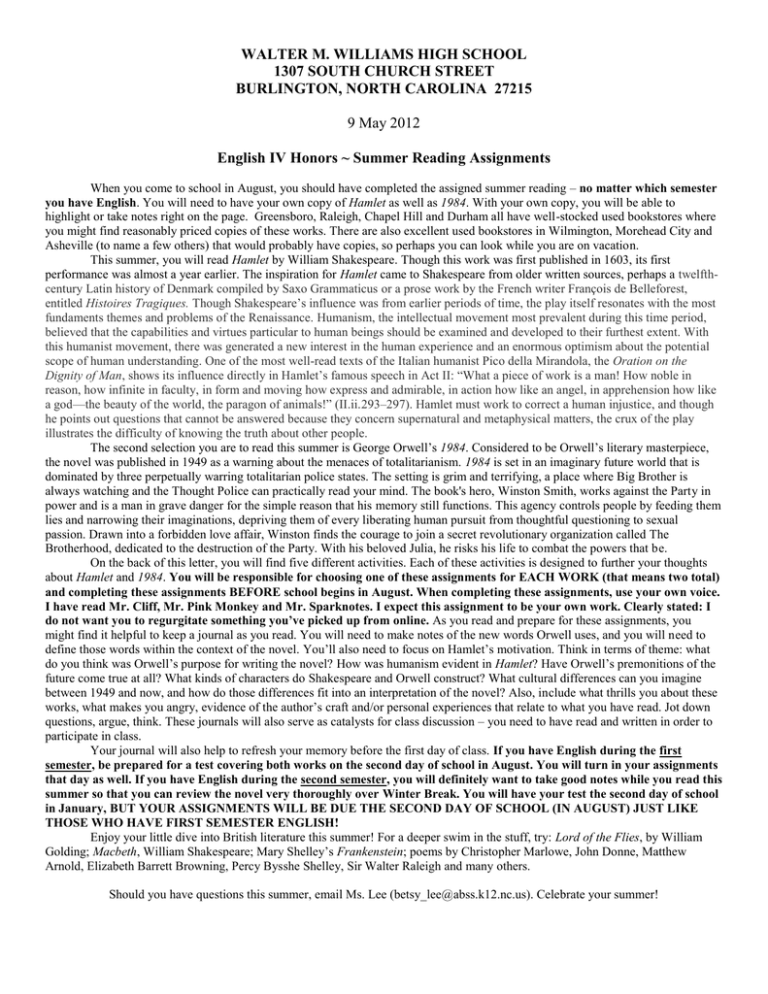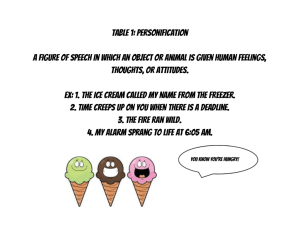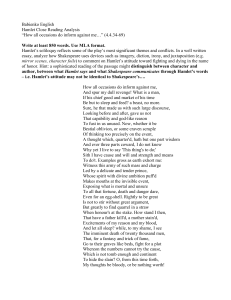English IV Honors ~ Summer Reading Assignments
advertisement

WALTER M. WILLIAMS HIGH SCHOOL 1307 SOUTH CHURCH STREET BURLINGTON, NORTH CAROLINA 27215 9 May 2012 English IV Honors ~ Summer Reading Assignments When you come to school in August, you should have completed the assigned summer reading – no matter which semester you have English. You will need to have your own copy of Hamlet as well as 1984. With your own copy, you will be able to highlight or take notes right on the page. Greensboro, Raleigh, Chapel Hill and Durham all have well-stocked used bookstores where you might find reasonably priced copies of these works. There are also excellent used bookstores in Wilmington, Morehead City and Asheville (to name a few others) that would probably have copies, so perhaps you can look while you are on vacation. This summer, you will read Hamlet by William Shakespeare. Though this work was first published in 1603, its first performance was almost a year earlier. The inspiration for Hamlet came to Shakespeare from older written sources, perhaps a twelfthcentury Latin history of Denmark compiled by Saxo Grammaticus or a prose work by the French writer François de Belleforest, entitled Histoires Tragiques. Though Shakespeare’s influence was from earlier periods of time, the play itself resonates with the most fundaments themes and problems of the Renaissance. Humanism, the intellectual movement most prevalent during this time period, believed that the capabilities and virtues particular to human beings should be examined and developed to their furthest extent. With this humanist movement, there was generated a new interest in the human experience and an enormous optimism about the potential scope of human understanding. One of the most well-read texts of the Italian humanist Pico della Mirandola, the Oration on the Dignity of Man, shows its influence directly in Hamlet’s famous speech in Act II: “What a piece of work is a man! How noble in reason, how infinite in faculty, in form and moving how express and admirable, in action how like an angel, in apprehension how like a god—the beauty of the world, the paragon of animals!” (II.ii.293–297). Hamlet must work to correct a human injustice, and though he points out questions that cannot be answered because they concern supernatural and metaphysical matters, the crux of the play illustrates the difficulty of knowing the truth about other people. The second selection you are to read this summer is George Orwell’s 1984. Considered to be Orwell’s literary masterpiece, the novel was published in 1949 as a warning about the menaces of totalitarianism. 1984 is set in an imaginary future world that is dominated by three perpetually warring totalitarian police states. The setting is grim and terrifying, a place where Big Brother is always watching and the Thought Police can practically read your mind. The book's hero, Winston Smith, works against the Party in power and is a man in grave danger for the simple reason that his memory still functions. This agency controls people by feeding them lies and narrowing their imaginations, depriving them of every liberating human pursuit from thoughtful questioning to sexual passion. Drawn into a forbidden love affair, Winston finds the courage to join a secret revolutionary organization called The Brotherhood, dedicated to the destruction of the Party. With his beloved Julia, he risks his life to combat the powers that be. On the back of this letter, you will find five different activities. Each of these activities is designed to further your thoughts about Hamlet and 1984. You will be responsible for choosing one of these assignments for EACH WORK (that means two total) and completing these assignments BEFORE school begins in August. When completing these assignments, use your own voice. I have read Mr. Cliff, Mr. Pink Monkey and Mr. Sparknotes. I expect this assignment to be your own work. Clearly stated: I do not want you to regurgitate something you’ve picked up from online. As you read and prepare for these assignments, you might find it helpful to keep a journal as you read. You will need to make notes of the new words Orwell uses, and you will need to define those words within the context of the novel. You’ll also need to focus on Hamlet’s motivation. Think in terms of theme: what do you think was Orwell’s purpose for writing the novel? How was humanism evident in Hamlet? Have Orwell’s premonitions of the future come true at all? What kinds of characters do Shakespeare and Orwell construct? What cultural differences can you imagine between 1949 and now, and how do those differences fit into an interpretation of the novel? Also, include what thrills you about these works, what makes you angry, evidence of the author’s craft and/or personal experiences that relate to what you have read. Jot down questions, argue, think. These journals will also serve as catalysts for class discussion – you need to have read and written in order to participate in class. Your journal will also help to refresh your memory before the first day of class. If you have English during the first semester, be prepared for a test covering both works on the second day of school in August. You will turn in your assignments that day as well. If you have English during the second semester, you will definitely want to take good notes while you read this summer so that you can review the novel very thoroughly over Winter Break. You will have your test the second day of school in January, BUT YOUR ASSIGNMENTS WILL BE DUE THE SECOND DAY OF SCHOOL (IN AUGUST) JUST LIKE THOSE WHO HAVE FIRST SEMESTER ENGLISH! Enjoy your little dive into British literature this summer! For a deeper swim in the stuff, try: Lord of the Flies, by William Golding; Macbeth, William Shakespeare; Mary Shelley’s Frankenstein; poems by Christopher Marlowe, John Donne, Matthew Arnold, Elizabeth Barrett Browning, Percy Bysshe Shelley, Sir Walter Raleigh and many others. Should you have questions this summer, email Ms. Lee (betsy_lee@abss.k12.nc.us). Celebrate your summer! English IV Honors Writing Assignments on 1984 and Hamlet (Choose one assignment for 1984 and one assignment for Hamlet. Feel free to choose a different assignment for each work.) Assignment 1: Personal and Expressive Writing Personal Letter: George Orwell died in 1950. Imagine that he is still alive and write him a letter sharing some of your responses to 1984. In what ways do you feel that his warnings are still relevant, although more than fifty years have passed since he wrote the novel? Do you feel more or less hopeful about the future than Orwell seems to have felt? Personal Letter: Though Shakespeare lived four hundred years ago, many of the experiences in Hamlet are still quite relevant to today’s society. In what ways are 1606 and 2006 alike? Do you believe in the optimism shared by humanist thinkers in the Renaissance? Length: 2-4 pages; 1” margins; double-spaced; Times New Roman (or Times on Macs) font; 12-point size. Assignment 2: Observation and Description Eyewitness Report: Think about the world Orwell describes in 1984. Are we moving toward that world? Report on an episode you witnessed that you feel reflects a move toward the conditions depicted in 1984. Record sensory details, dialogue and action so that your readers feel they are witnessing the event. Eyewitness Report: Imagine that you witness a murder much like the one in Hamlet. You know that if you report the murder, those involved might seek you as their next victim. Record sensory details, dialogue and action so that your readers feel they are witnessing the event. Length: 2-4 pages; 1” margins; double-spaced; Times New Roman (or Times on Macs) font; 12-point size. Assignment 3: Narrative Literary Writing Story: Remember the Parsons’ seven-year-old girl, the avid member of the Spies who turns in her father to be tortured? Write an episode that could be part of a story about her life twenty years later. Give the girl a name and have her recall the events of her childhood. Think about how the London of 1984 might change in twenty years, about the kind of adult the girl might become, about her relationship to the Party and about the conflicts she might experience. Choose details that will bring the setting, characters and plot of your story to life for your readers. Story: Consider Ophelia’s grief and confusion about the loss of her father, especially at the hands of the man she deeply loves. What might she want her final words to be? Construct a suicide letter left from Ophelia to another character in the play. Think about who Ophelia is, about her relationship to the character you choose and about her mental condition at the time she is writing this letter. Choose details that will bring the setting, characters and plot of your story to life for your readers. Length: 2-4 pages; 1” margins; double-spaced; Times New Roman (or Times on Macs) font; 12-point size. Assignment 4: Informative Exposition: Character Analysis Character Analysis: Choose one of the following characters from 1984 about whom to write a character analysis focusing either on three traits, one significantly dominant trait or the definition of this character as static or dynamic. Characters: Winston Smith, Julia, O’Brien, Big Brother, Mr. Charrington, Syme, Parsons, Emmanuel Goldstein. Character Analysis: Choose one of the following characters from Hamlet about whom to write a character analysis focusing either on three traits, one significantly dominant trait of the definition of this character as static or dynamic. Characters: Hamlet, Ophelia, Claudius, Gertrude, Polonious, the Ghost of Hamlet’s father. Length: 2-4 pages; 1” margins; double-spaced; Times New Roman (or Times on Macs) font; 12-point size. Assignment 5: Responding to Literature Personal Response: Three major forces in 1984 are hate, love and fear. Which of the three do you think Orwell considered strongest? Which do you consider strongest? In a personal response essay, use specific details from 1984 and from your own experience to explain and support your answers. Personal Response: Three major themes within Hamlet are loyalty, revenge and madness. Which of the three do you think Shakespeare considered strongest? Which do you consider strongest? In a personal response essay, use specific details from Hamlet and from your own experience to explain and support your answers. Length: 2-4 pages; 1” margins; double-spaced; Times New Roman (or Times on Macs) font; 12-point size.





